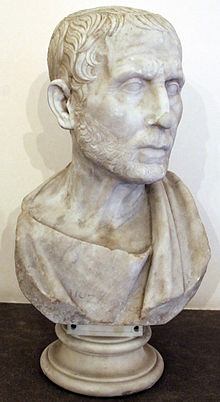Posidonius | |
|---|---|
 Bust of Posidonius from the Naples National Archaeological Museum | |
| Born | c. 135 BC |
| Died | c. 51 BC (aged 83–84) |
| Era | Hellenistic philosophy |
| Region | Western philosophy |
| School | Stoicism |
Main interests | Astronomy, geography, history, mathematics, meteorology, philosophy, physics |
Posidonius (/ˌpɒsɪˈdoʊniəs/; ‹See Tfd›Greek: Ποσειδώνιος Poseidṓnios, "of Poseidon") "of Apameia" (ὁ Ἀπαμεύς) or "of Rhodes" (ὁ Ῥόδιος) (c. 135 – c. 51 BC), was a Greek politician, astronomer, astrologer,[1] geographer, historian, mathematician, and teacher native to Apamea, Syria.[2][3][4][5][6] He was considered the most learned man of his time and, possibly, of the entire Stoic school.[7] After a period learning Stoic philosophy from Panaetius in Athens, he spent many years in travel and scientific researches in Spain, Africa, Italy, Gaul, Liguria, Sicily and on the eastern shores of the Adriatic. He settled as a teacher at Rhodes where his fame attracted numerous scholars. Next to Panaetius he did most, by writings and personal lectures, to spread Stoicism to the Roman world, and he became well known to many leading men, including Pompey and Cicero.
His works are now lost, but they proved a mine of information to later writers. The titles and subjects of more than twenty of them are known. In common with other Stoics of the middle period, he displayed syncretic tendencies, following not just the earlier Stoics, but making use of the works of Plato and Aristotle. A polymath as well as a philosopher, he took genuine interest in natural science, geography, natural history, mathematics and astronomy. He sought to determine the distance and magnitude of the Sun, to calculate the diameter of the Earth and the influence of the Moon on the tides.
- ^ Augustine of Hippo, The City of God Book V, Chapter 2, "Posidonius the Stoic, who was much given to astrology"
- ^ Chisholm, Hugh, ed. (1911). . Encyclopædia Britannica. Vol. 22 (11th ed.). Cambridge University Press. p. 172.
- ^ Magill, Frank Northen; Aves, Alison (1998). Dictionary of World Biography. Taylor & Francis. pp. 904–910. ISBN 978-1579580407. Retrieved 28 May 2013.
- ^ Sarton, George (1936). "The Unity and Diversity of the Mediterranean World". Osiris. 2: 406–463 [430]. doi:10.1086/368462. S2CID 143379839.
- ^ Kidd, I. G. (7 March 2016). "Posidonius (2), Stoic philosopher, c. 135–c. 51 BCE". Oxford Research Encyclopedia of Classics. doi:10.1093/acrefore/9780199381135.013.5275. ISBN 978-0199381135. Retrieved 14 January 2021.
- ^ Kidd, Ian Gray (2005), "Posidonius", The Oxford Classical Dictionary, Oxford University Press, doi:10.1093/acref/9780198606413.013.5275 (inactive 1 November 2024), ISBN 978-0198606413, retrieved 14 January 2021
{{citation}}: CS1 maint: DOI inactive as of November 2024 (link) - ^ "Poseidonius | Greek philosopher". Encyclopedia Britannica. Retrieved 3 October 2021.